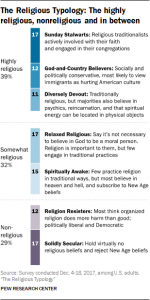Sometimes in the midst of immediate, internet-generated daily drama in the Church, it is very helpful to step back and look at bigger-picture matters. The beginning of the school year – meeting new students – always makes me ponder, “Who are these new faces?” Mostly, they are not hanging on the latest report about this or that bishop!
At the same time, The Pew Research Center has released another one of their excellent studies, this time constructing a “religious typology” of Americans. Rather than slice and dice Americans based on demographic data, denominational affiliation, or partisanship, the study refreshingly seeks to identify types extracted from cluster groups that strongly share certain defining (and differentiating) characteristics. As with any typology, one has to recognize limitations – but I think they’ve yielded some fascinating insights.
Here are some observations about this, based on going deeper into the data, especially the differences used to cluster:
- There are two substantial blocs of Americans who literally live in different (and pretty conflicting) worlds. Pew tries to range these categories on a spectrum, but the 29% of Americans in the first two categories primarily differ on whether they show up regularly for church and church groups (Sunday Stalwarts overwhelmingly do, whereas God-and-Country Believers almost never participate in church groups, but most pray daily). But both have very positive feelings toward religion. On the other hand, the 29% in the non-religious groups basically differ in terms whether they are materialists or have some kind of sense of generic spirituality, often focused on nature. What unites the two non-religious groups are almost-total rejections of the very idea of religious revelation, and (logically) they have shared negative views about religious organizations in general. While of course most people are not theologians, it is striking that there is really a total opposition between these groups about the question of revealed religion. For the former, it’s not only the case that there is a god, but that it’s a god who has revealed something. For the latter, the whole idea of revelation is objectionable.
- The middle groups in the typology are squishy. I’ve tried to understand what I take to be the three middle groups. For example, I am unclear why “diversely devout” is “devout,” given a very low level of regular church attenders, though they are more likely than the other middle groups to state that they derive “a great deal of meaning” from their religious faith. In fact, the key differentiators seem to be that diversely devout all believe in “spiritual energies in physical things” whereas NONE of the “relaxed religious” do, and the DD also all believe that “it is necessary to believe in God to be moral,” while only 1% of relaxed religious do. (The DD is the only one of the seven groups that has a strong Hispanic skew.) And the “spiritually awake” group reminded me of Christian Smith’s moralistic therapeutic deists, who mix prayer, belief in “spiritual energy,” conventional beliefs about the afterlife, and high interest in nature with almost no religious participation or convictions about revelation. One wonders if this group is mostly on the way to the non-religious category – certainly this is the group that, to a theologian, seem to have the least interest in assembling a relatively coherent view about religion. But this is somewhat the case for all the three middle groups; there can actually be some sense in which the 29% at each end can be said to have somewhat coherent worldviews, but the middle groups seem almost like transitional states in a chemical reaction – they are unlikely to persist over time.
- Non-religious Americans are mostly rich, white, and male. As I mentioned, the typology is refreshing because it actually divides up Americans on substantial questions, not on demographic identity. But demographically the most interesting element was certainly the fact that “solidly secular” is the whitest (79%) and wealthiest (46% make over $75,000) and most male (65%) group. It is politically interesting that so often rich white males are cast in certain roles in cultural conflicts, when in fact they seem to dominate quite a different space if we are thinking in religious terms. By contrast, Sunday stalwarts are only 63% white, only 27% make over $75,000, and they are 57% female.
- Most Americans do not put their religious identity first as most meaningful. An interesting question in the survey was a long series of things that could “give meaning to your life” – and one could answer “a great deal” to as many as you wanted. But then the person was asked, of all the things which give you a great deal of meaning, which one means the most. By far the most popular response was “spending time with family” (40%), and only 20% said “religious faith” – however, at least that was #2. No other answer go more than 6% (that was “pets”). But every group feels strongly about family. There is not a complete breakdown by type, but Pew does not that only the Sunday Stalwarts group had their #1 answer be “religious faith” (God and Country had family and religion basically tied) – and 65% of the Sunday Stalwarts said religious faith was the most important. So, again as a theologian, I find this question so important – in part because it is so non-ideological. It is not asking whether you find religious faith important because you are out serving the vulnerable or because you are participating in a lot of devotional actions or because you are standing on a DC street corner trying to evangelize. The point is: God or religion isn’t serving something else, some higher good (in theory – yes, I know these are self-reports).
In meeting my students, I had them do an anonymous pre-test. I am teaching a marriage and family theology undergrad elective, and I asked as one question for them to indicate how important getting married and having a family was in terms of their overall life goals. The “strongest” answer was that it was more important than any other goal – an answer many students chose, regardless of some of their other answers, which indicated the expected diversity of belief about many questions in marriage and family ethics! But one student chose the response “it’s an important goal, but some other goals are as or more important” – and illuminated this by putting a list: “1. God, 2. marriage, 3. Children” A Sunday Stalwart in the making.



